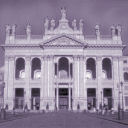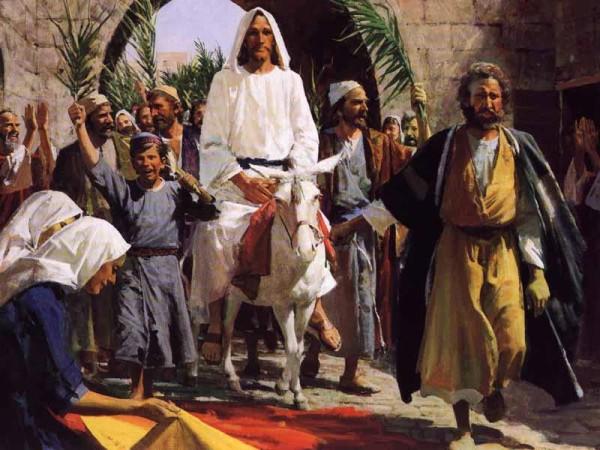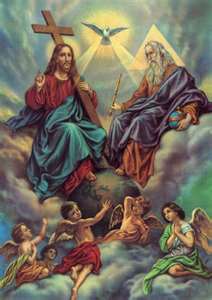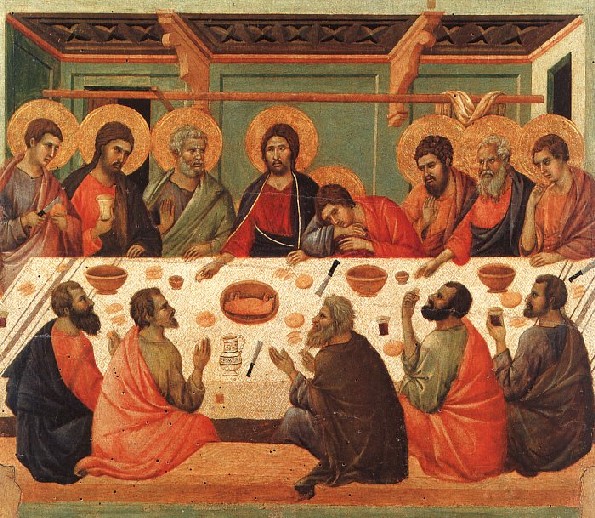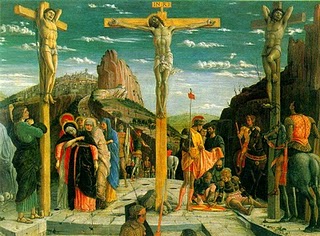On this coming Sunday, the Church will bring us to what may be one of my favorite Masses and my favorite sets of Scripture readings in the entire liturgical year: Palm Sunday of the Passion of the Lord, popularly known simply as ‘Palm Sunday’.
With the Palm Sunday readings, the Church ushers us into the climax of the liturgical year in the celebration of Holy Week. This is the last Sunday feast before the beginning of the Triduum, which will climax in the celebration of Easter (Latin Pascha), what the Catechism calls the “feast of feasts” (CCC 1169).
As you may recall—especially if you have young children who need to be held the entire time the Gospel is being proclaimed!—this is one of the longest sets of readings in the entire liturgical year. For on this Sunday, the Church not only commemorates the Triumphal Entry of Jesus into Jerusalem six days before the Passover; she also lays before the faithful the complete account of Jesus’ Passion and death, according to one of the Synoptic Gospels (This year, being Year C, it is Luke’s account that we will hear.)
Given the sheer number and length of readings for this Sunday, it should go without saying that I can’t give a full analysis of them all. (Whole books have been written just on Luke’s account of the Passion!) Instead, what I’d like to do in this post is focus our attention on the Old Testament roots of the opening Gospel—the Triumphal Entry into Jerusalem—and show the deeper meaning behind Jesus’ actions and the way in which it anticipates the mysteries that will be revealed in the rest of the Palm Sunday readings, in his Passion, and in the Mass itself.
The Triumphal Entry of Jesus according to Luke
Unlike other Masses, Palm Sunday contains two proclamations of the Gospel. The first is from Luke’s account of Jesus Triumphal Entry into Jerusalem:
Jesus proceeded on his journey up to Jerusalem. As he drew near to Bethphage and Bethany at the place called the Mount of Olives, he sent two of his disciples. He said, “Go into the village opposite you, and as you enter it you will find a colt tethered on which no one has ever sat. Untie it and bring it here. And if anyone should ask you,‘Why are you untying it?’ you will answer, ‘The Master has need of it.’” So those who had been sent went off and found everything just as he had told them. And as they were untying the colt, its owners said to them, “Why are you untying this colt?”They answered,“The Master has need of it.” So they brought it to Jesus, threw their cloaks overthe colt, and helped Jesus to mount. As he rode along, the people were spreading their cloaks on the road; and now as he was approaching the slope of the Mount of Olives, the whole multitude of his disciples began to praise God aloud with joy for all the mighty deeds they had seen. They proclaimed: “Blessed is the king who comes in the name of the Lord. Peace in heaven and glory in the highest.” Some of the Pharisees in the crowd said to him, “Teacher, rebuke your disciples.” He said in reply, “I tell you, if they keep silent, the stones will cry out!” (Luke 19:28-40; New American Bible)
Now, there are many aspects of this event that could command our attention. But the two that I think are most critical to a proper understanding of the event are (1) the Jewish roots of Jesus’ act of riding the colt into the city, and (2) the Jewish roots of the crowd’s response to his action.
Why Does Jesus Ride a Colt into Jerusalem?
As is fairly well known, by choosing to publicly mount and ride a “colt” into Jerusalem in the midst of the procession of so many Passover pilgrims into the city, Jesus is performing what scholars refer to as a prophetic sign—a symbolic act which is meant to both symbolize and set in motion some major event in the history of salvation. In this case, Jesus’ act of riding the colt into Jerusalem harks back to Zechariah’s prophecy of the advent of the Messiah—the long-awaited king of Israel—to the city of Jerusalem (see Zechariah 9:9). However, there is more here than simply an implicitly messianic public act. For when we go back to the prophecy of Zechariah and read it in its full context, we discover several other important features of this particular messianic king:
Rejoice greatly, O daughter of Zion! Shout aloud, O daughter of Jerusalem! Lo, your king comes to you; triumphant and victorious is he, humble and riding on an ass, on a colt the foal of an ass. I will cut off the chariot from Ephraim and the war horse from Jerusalem; and the battle bow shall be cut off, and he shall command peace to the nations; his dominion shall be from sea to sea, and from the River to the ends of the earth. As for you also, because of the blood of my covenant with you, I will set your captives free from the waterless pit. (Zechariah 9:10-11)
Three aspects of Zechariah’s prophecy are worth highlighting here: (1) he is a king of peace, not war; (2) he is king of the whole world; and (3) he will set his people free from “the Pit”—the realm of the dead—through the blood of the covenant. Let’s take a minute to look at each of these in turn and see how they are fulfilled in the Passion of Jesus.
1. The King Who Rides the Colt will be a King of Peace
First, notice that according to Zechariah, the messianic king who will come riding on a colt into Jerusalem is not just any kind of king: he is a king of peace. He will not be coming to wage earthly warfare, but to make the chariot and the war horse cease from Jerusalem.
The Palm Sunday readings will make the same point in Luke’s account of Jesus’ Passion: in Gethsemane, when Jesus’ disciples realize that he is about to be arrested, they begin to fight back with the sword, and one of them (Simon Peter, as we know from John’s Gospel), cuts off the “right ear” of the high priest’s servant. In response to this, Jesus declares:
“Stop, no more of this!” Then he touched the servant’s ear and healed him. (Luke 22:51 NAB)
Although he is Messiah, neither Jesus (nor his followers) will rule through the power of the sword, but through the power of imitating him—-the “one who serves”—and by taking up their crosses to follow him (see Luke 22:24-27).
2. The King Who Rides the Colt will be King of the World
Second, notice also that according to Zechariah’s prophecy, the king that will come riding a colt will also be a universal king; his dominion shall not be just over the people of Israel, but to the ends of the earth (Zech 9:10).
Once again, we see this element of Jesus’ Triumphal Entry fulfilled in his Passion and death. Although the inscription his executioners put above his head read, “This is the King of the Jews” (Luke 23:38), at the moment of his death, it is a Gentile centurion who recognizes the innocence of Jesus:
It was now about noon and darkness came over the whole land until three in the afternoon because of an eclipse of the sun. Then the veil of the temple was torn down the middle. Jesus cried out in a loud voice, “Father, into your hands I commend my spirit”; and when he had said this he breathed his last. The centurion who witnessed what had happened glorified God and said, “This man was innocent beyond doubt.” When all the people who had gathered for this spectacle saw what had happened, they returned home beating their breasts… (Luke 22:44-48)
As I was preparing this reflection, I could not help but note one striking application to the present celebration of the liturgy. Not only does Jesus’ rule over the Gentile nations begin when the Gentile centurion recognizes his innocence, but it is also at this very moment—the moment of his death— that the Lectionary contains a rule for the faithful throughout the world to kneel. It says:
[Jesus] breathed his last
[Here all kneel and pause for a short time.]
The centurion who witnessed what had happened glorified God…
By inserting our act of kneeling into the moment between Jesus death and the recognition of the Gentile centurion, in a certain way, the Liturgy itself realizes the prophecy of Zechariah 9. At this moment, on Palm Sunday, throughout the world, Gentiles everywhere will kneel to the King of the Jews. Indeed, one cannot help but see in the liturgical act of the faithful kneeling in silence at the death of Jesus a fulfillment of the Second Reading for Palm Sunday:
Christ Jesus, though he was in the form of God, did not regard equality with God something to be grasped. Rather, he emptied himself, taking the form of a slave… he humbled himself, becoming obedient to the point of death, even death on a cross. Because of this, God greatly exalted him and bestowed on him the name which is above every name, that at the name of Jesus every knee should bend… (Philippians 2:5-10)
3. The King Who Rides the Colt, the Blood of the Covenant, and the Release from “the Pit”
Third and finally, according to Zechariah’s prophecy, the king who rides the colt into Jerusalem will not deliver his people through the shedding of blood in battle, but through the mysterious “blood of the covenant,” which will somehow set captives free from the realm of the dead known as “the Pit” in the Old Testament (Zech 9:10-11).
Once again, this Old Testament background of Jesus’ Triumphal Entry on Palm Sunday ultimately points forward to what he will accomplish in his Passion. For in the Upper Room, at the Last Supper, we find a striking parallel with Zechariah’s prophecy:
When the hour came, Jesus took his place at table with the apostles…Then he took the bread, said the blessing, broke it, and gave it to them, saying, “This is my body, which will be given for you; do this in memory of me.” And likewise the cup after they had eaten, saying, “This cup is the new covenant in my blood, which will be shed for you.” (Luke 22:19-22)
In other words, by means of his Triumphal Entry, Jesus is signaling much more than just the fact that he is the Messiah.He is also signaling what kind of Messiah he will be, and by what means he will set his people free from captivity—not by the blood of warfare, but by the blood of the covenant, which he will pour out under the appearance of wine in the Upper Room and on the wood of the Cross on Good Friday. It is by means of this blood, poured out upon the Cross on Calvary, that he promises the penitent thief that he will not go down to the shadows of the Pit, but into the glory of Paradise:
Now one of the criminals hanging there reviled Jesus, saying, “Are you not the Christ? Save yourself and us.” The other, however, rebuking him, said in reply, “Have you no fear of God, for you are subject to the same condemnation? And indeed, we have been condemned justly, for the sentence we received corresponds to our crimes, but this man has done nothing criminal.” Then he said, “Jesus, remember me when you come into your kingdom.” He replied to him, “Amen, I say to you, today you will be with me in Paradise.” (Luke 22:39-43)
Note it well: the difference between the ‘good thief’ and the ‘bad thief’ is really about how they understand the nature of Jesus’ kingship. The first thinks Jesus Messiahship means that he will save his subjects from suffering and physical death. The good thief recognizes that Jesus kingdom is not of this world, and Jesus reveals to him, in the very midst of his agony, that the restoration he has come to give is not to the earthly land of Israel but to the promised land of “Paradise.”
The Palm Branches and the King Who Goes Up to the Altar to Offer Sacrifice
Finally, bringing our reflection to a close, I would like to make one last point about the crowd’s response to Jesus’ triumphal entry, with their proclamation of the words “Blessed is the king who comes in the name of the Lord!” (Luke 19:38). As is also well known, the crowd is taking this chant from Psalm 118, a popular song that was sung during the feasts of Passover and Tabernacles. However, once again, when we go back and look at the Psalm in context, we discover yet again several striking features of the king whose arrival is being celebrated:
Open to me the gates of righteousness, that I may enter through them and give thanks to the LORD… The stone which the builders rejected has become the head of the corner… Save us, we beseech thee, O LORD! O LORD, we beseech thee, give us success! Blessed be he who enters in the name of the LORD! We bless you from the house of the LORD. The LORD is God, and he has given us light! Bind the festal procession with branches, up to the horns of the altar! Thou art my God, and I will give thanks to thee.. (Psalm 118:19, 22, 25-28).
Although much could be said about this passage, for our purposes here, one point above all should stand out: When the crowds greet Jesus with palm braches and chants, they are reenacting the words of Psalm 118. Yet in the Psalm itself, notice that the king is not simply coming into the city (‘open to me the gates)—he is going up to the Temple to offer sacrifice. And not just any kind of sacrifice, but the “thanksgiving” sacrifice, known in Hebrew as the todah offering (see Leviticus 7).
Once this Old Testament background to the crowd’s response is in place, the deeper meaning of Jesus’ Triumphal Entry is revealed. The crowds with their branches and their Psalms have it right: Jesus is the king of Israel; he has come to his city; and he is going up to the altar to offer a sacrifice of thanksgiving. But the sacrifice he is going to offer is not that of bulls or goats, but of himself. And the todah that he will give will begin with the Eucharist celebrated in the Upper Room and be consummated on the altar of the Cross.
The Catechism on the Triumphal Entry, the Eucharist, and Holy Week
In other words, at every Mass, when we proclaim—“Blessed is He Who Comes in the Name of the Lord,Hosanna in the Highest!”—we are not only remembering the first Palm Sunday. Even more, we are celebration the liturgical coming of the King into our midst, as he ‘ascends’ to the altar of the Eucharist. As he said at the Last Supper, there he ‘pours out’ the blood of the new covenant in the one eternal offering by which we too are given peace and prepared to enter into the kingdom of Paradise. In the words of the Catechism of the Catholic Church:
How will Jerusalem welcome her Messiah? Although Jesus had always refused popular attempts to make him king, he chooses the time and prepares the details for his messianic entry into the city of “his father David”. Acclaimed as son of David, as the one who brings salvation (Hosanna means “Save!” or “Give salvation!”), the “King of glory” enters his City “riding on an ass”. Jesus conquers the Daughter of Zion, a figure of his Church, neither by ruse nor by violence, but by the humility that bears witness to the truth… Their acclamation, “Blessed be he who comes in the name of the Lord”, is taken up by the Church in the “Sanctus” of the Eucharistic liturgy that introduces the memorial of the Lord’s Passover.
Jesus’ entry into Jerusalem manifested the coming of the kingdom that the King-Messiah was going to accomplish by the Passover of his Death and Resurrection. It is with the celebration of that entry on Palm Sunday that the Church’s liturgy solemnly opens Holy Week. (CCC 559-560)
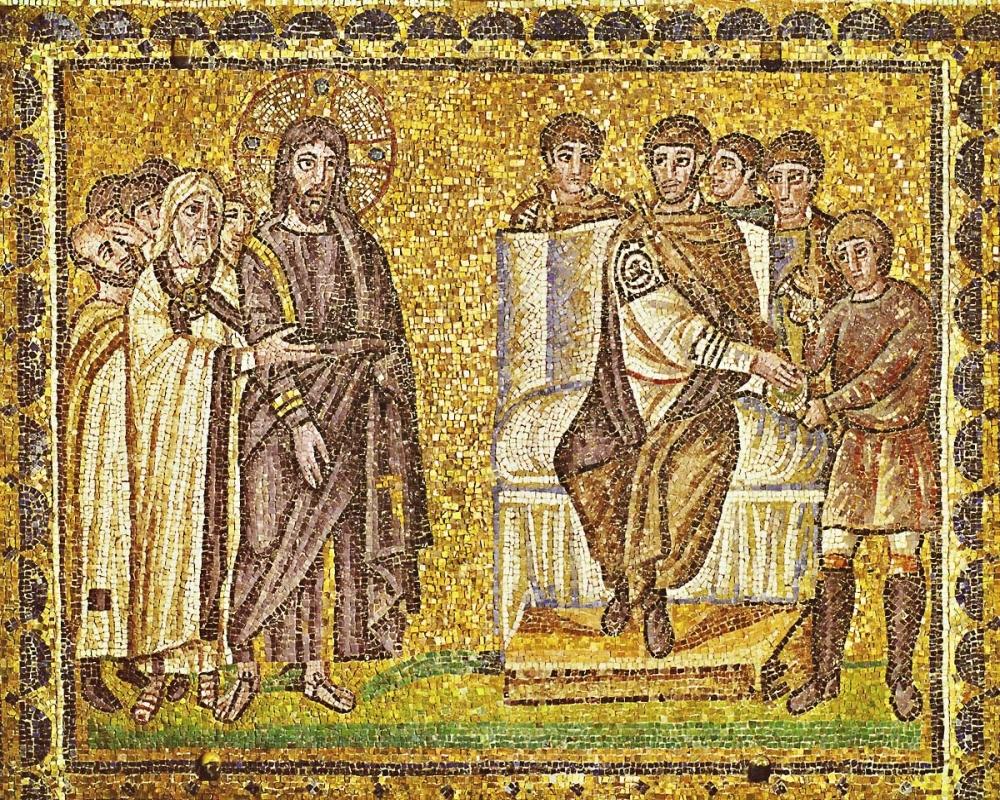

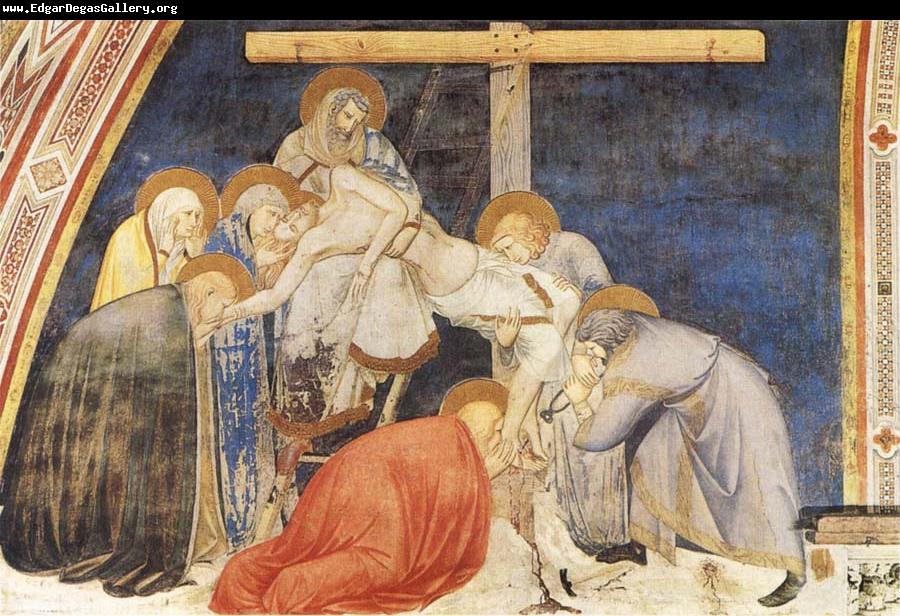
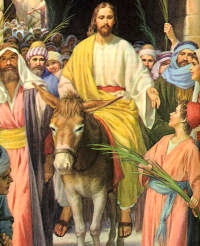
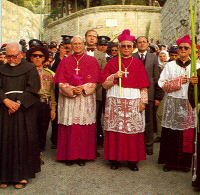 The priests and deacons wear red vestments for Mass. There is a special entrance at the beginning of each Mass, either simple or solemn. This includes a blessing of the palms and the gospel reading of the entrance into Jerusalem (Matt 21:1-11; Mark 11:1-10; John 12:12-16; Luke 19:28-40). The introduction by the priest explains the solemnity of Holy Week, and invites the faithful to take full part in the celebration:
The priests and deacons wear red vestments for Mass. There is a special entrance at the beginning of each Mass, either simple or solemn. This includes a blessing of the palms and the gospel reading of the entrance into Jerusalem (Matt 21:1-11; Mark 11:1-10; John 12:12-16; Luke 19:28-40). The introduction by the priest explains the solemnity of Holy Week, and invites the faithful to take full part in the celebration: 